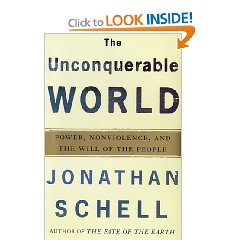This is the first of three “must read” books that I am reviewing today, and it is first because the other two are best appreciated after absorbing this one. The other two books are “IMPERIAL HUBRIS” and “OSAMA'S REVENGE.”
The main weakness of this book is the author's lack of strong criticism of Pakistan, Egypt, and Saudi Arabia, and of other states that are corrupt, repressive, and therefore a huge part of the problem. Having said that, here are some of the key points:
– “West” pioneered genocide, expulsions, and religious wars, with Spanish genocide of Indians in Americas, and Spanish expulsion of first the Jews and then the Muslims as critical starting points in understanding Muslim rage today
– America adopted terrorism as a preferred means of fighting proxy wars in both Central America and Africa, when Reagan began “rollback” with the same neo-conservative advisors that guide Bush II today.
– West has four dogmas as summed up by Edward Said (who is admired by the author): 1) that Orient is aberrant, undeveloped and inferior; 2) that Orient is inflexibly tied to old religions texts, unable to adapt; 3) that Orient is inflexibly uniform and unable to do nuances; and 4) Orient is either to be feared (Green or Yellow or Brown Peril) or controlled.
– Fundamentalism actually started in the US among the Christians seeking to insert religion into the state's business and ultimately demanding faith and loyalty as the litmus tests for acceptance.
– Earlier generations of Islamic reformists disavowed violence, but ended up adopting violence after being in state prisons (e.g. Egypt).
– Earlier incarnations of a Muslim revival were in the open literature in the 1920's and then in the 1960's, and lastly in the 1980's to date–our national “intelligence” agencies appear to have missed the importance of all three
– Viet-Nam, Africa, and Central America all fostered extremely unhealthy connections between CIA covert operations and the drug trade, with CIA routinely condoning and often actively enabling massive drug operations and related money laundering, as the “price” of moving forward on covert operations.
– The obsession with winning the Cold War at all costs essentially destroyed U.S. foreign policy and set U.S. up as the enemy of the Third World [see Derek Leebaert's “The Fifty-Year Wound”].
– Morality in the US has been perverted, as the extreme right, joining with extreme Zionists, has “captured” the U.S. government in both Congressional and Executive terms. Orwellian “spin” together with the labeling of all dissent, made possible by media corporations “going along”, has destroyed any possibility of informed, objective, or actually moral dialog.
– The Central American campaign pioneered the privatization of terrorism and proxy war by the US, with secrecy and deception of the US public being the principal role of the US government.
– The US Government is explicitly accountable for introducing bio-chemical weapons into the Iraqi arsenal, and thus accountable for the genocide and war crimes attendant to their use.
– US (AID) sponsored textbooks, such as those created by the University of Nebraska, routinely used terrorism against Russians as examples in the mathematic and other textbooks being distributed in Afghanistan.
– CIA's main contribution to the destabilization of the world has been in its Afghan-related privatization of information about how to produce and spread violence, and its training of tens of thousands of jihad warriors from all over the world who have now returned home and are teaching and leading others.
– Under US leadership, Afghanistan has gone from providing 5% of the global opium production in 1980, to 71% in 1990, and even more today–much of which comes to the US.
– America not only accepts massive drug activities as part of the “cost of doing business”, but also ignores human rights in its rush to cozy up to corrupt dictators.
– From an Iraqi point of view, the 1.5 million or so children that died in Iraq due to the sanctions, must be seen as a major war crime and a form of terrorism, together with the air war with its indiscriminate murder of thousands if not tens of thousands civilians including women and children. The US has killed more civilians in Iraq than it did in Japan with two atomic bombs. Napalm and depleted uranium are disabling US troops as well as Iraqi civilians long after their use in the field.
– Economic sanctions, when they have the impact they did in Iraq, must be considered weapons of mass destruction, their application terrorism, and their results war crimes.
– The US Government's general disdain for the rule of law, but the incumbent Administration's particular focus on ignoring treaties and refusing accountability (e.g. for war crimes) sets a new low standard for immoral behavior by nation-states.
– The UN Secretary-General was forced by the US to ignore the Rwandan genocide because of a US desire to keep everyone focused on Sarajevo, and continues to us its veto power to prevent UN from being effective against racist Zionism, which is routinely committing crimes against humanity with its Palestinian campaign.
The author concludes, without sounding inflammatory, that America was built on two monumental crimes: the genocide of the Native Americans, and the enslavement of African Americans. His point: the US is in denial over this reality, while the rest of the world is completely aware of it. He agrees with Jonathan Schell, concluding as Schell does in “Unconquerable World,” that the challenge of our times is in “how to subdue and hold accountable the awesome power that the United States built up during the Cold War.” The last sentence is quite powerful: “America cannot occupy the world. It has to learn to live in it.”










